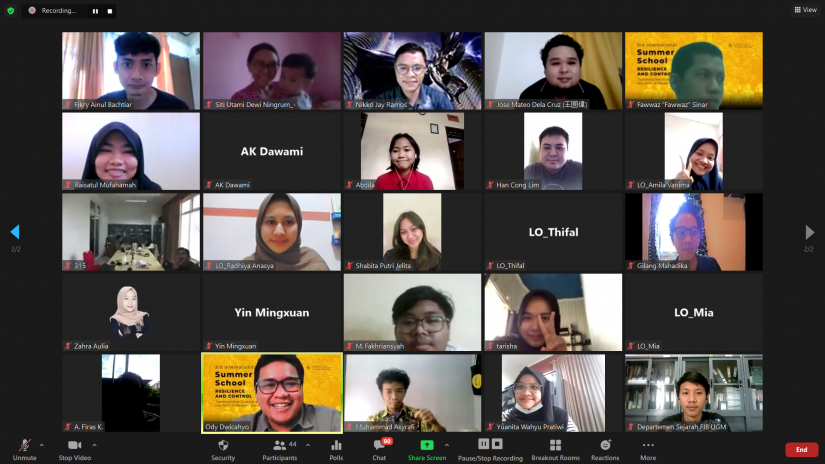
The Covid-19 pandemic has been a great shock to humanity. In one night, the world that was busy welcoming the second decade of the 21st century must abruptly close. The economy suddenly plummeted together with the unexpected yet impactful disruption in socio-cultural activities. The government underwent every possible measurement to confine people at their houses or designated quarantine facilities while struggling to provide subsidies for impacted work fields. In confinement, people hardly adjust themselves to the situation while pondering whether humanity could survive this pandemic. Amidst the reflection, a question popped up: the Covid-19 is not the first pandemic in human history. To what extent have we learned from our past experiences dealing with similar issues?
Department of History Universitas Gadjah Mada attempted to address the posed question through a virtual summer school entitled “Resilience and Control: Transmissible Disease and the Rise of Modern Society.” The virtual event was held between 2-22nd August 2021. It marked the third year of the Department of History’s summer school that emphasizes its themes on transnational history. On 2nd August 2021, 10:00 AM Western Indonesian Time, the summer school was warmly opened by the Head of UGM Office of International Affairs, I Made Andi Arsana, S.T., M.Sc, P.hD, a representative of the partner university, Prof. Dr. Kate McGregor from Melbourne University Australia, and the Head of History Department UGM, Dr. Abdul Wahid, M.A.
Despite the challenges, the 3rd summer school (which also the first virtual summer school organized by the Department of History and Faculty of Cultural Sciences) involved about fifty participants and twenty lecturers. The accepted participants consist of about twenty-five international and forty local participants. The international participants originate from twelve countries: France, Sri Lanka, India, Thailand, Vietnam, Malaysia, Singapore, Taiwan, People’s Republic of China, The Philippines, Timor Leste, and Australia. Meanwhile, participants from Indonesia are affiliated with well-known universities throughout the country, namely: Universitas Indonesia, Universitas Padjajaran, UIN Sunan Kalijaga, Institut Seni Indonesia Yogyakarta, UIN Raden Mas Said, Universitas Halu Oleo, and Universitas Paramadina, among others.
The participants rigorously followed twenty online lectures with a variety of topics. Some presenters are affiliated with partner universities that have contributed to the first two summer schools, namely: Prof.Dr. Kate McGregor (Melbourne University), Prof.Dr. Danny Wong Tze Ken (University of Malaya), Ariel Lopez, P.hD (University of the Philippines), Prof.Dr. Wasana Wongsurawat (Chulalongkorn University), and Asst.Prof. Adisorn Muakpimai (Thammasat University).
Other presenters are new names who also provided fresh insights about the pandemic in human history from various angles, namely: the official’s response toward the pandemic, how government (including the colonial regime) dealt with pandemics of the past, how the art survives amidst the pandemic, and the usage of cultural archives in the pandemic-restricted research. Among the “newcomers” are Prof.Dr. Martijn Eickhoff (the newly-elected director of NIOD Institute Amsterdam), Dr. Sadiah Boonstra (the owner of Sadiah Curates), and Ravando, M.A. (the author of the best selling book Perang Melawan Influenza: Pandemi Flu Spanyol di Indonesia Masa Kolonial 1918-1919).
In the middle of the lectures, the participants also enjoyed virtual refreshing activities: virtual museum tours to Museum Kebangkitan Nasional Jakarta and Museum Sono Budoyo Yogyakarta, online documentary screenings, and virtual game sessions. In addition, the participant was also expected to deliver two kinds of works: a reflection paper and group presentations. Regarding the latter, creativity was definitely an understatement for the presented results.
The presentation topics ranged from the contemporary historical research on the bird flu, movies as media of citizens’ expression toward the lockdown policy, geography and its relations to government’s responses in dealing with Covid-19, Hindunese funeral during the pandemic, language of the lockdowns in Indonesia and the Philippines, and the consumption of herbal medicine.
Despite the virtual event, the participants were in unison on how grateful they were for getting new friends and learning new lessons. For example, Nikko Jay Ramos, a participant from the Philippines, admitted that he was nervous about how the three-week virtual event would unfold. But as the events were progressing, Nikko learned that he still managed to make friends and learn so much from the lectures. A similar experience was shared by Trinh Hoang My Duong, one of the Vietnamese participants, who apparently has an Indonesian alias of “Matahari.” The participants also closed the session with promises to visit each other as soon as the situation permits. This summer school won’t be possible without the hard work of the eleven organizing committees and twelve student liaison officers day in day out for about three weeks. (Satrio Dwi Cahyo)
